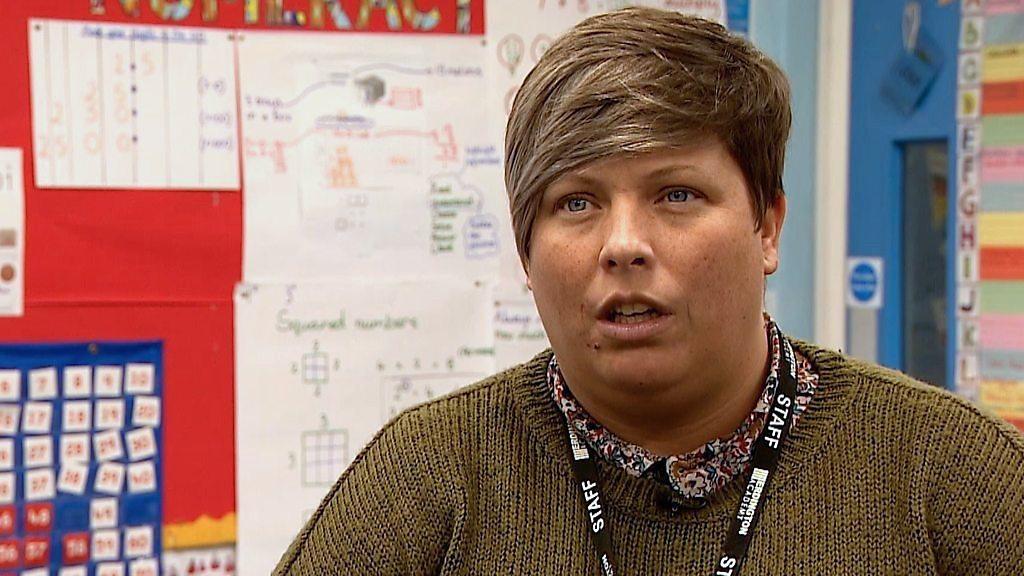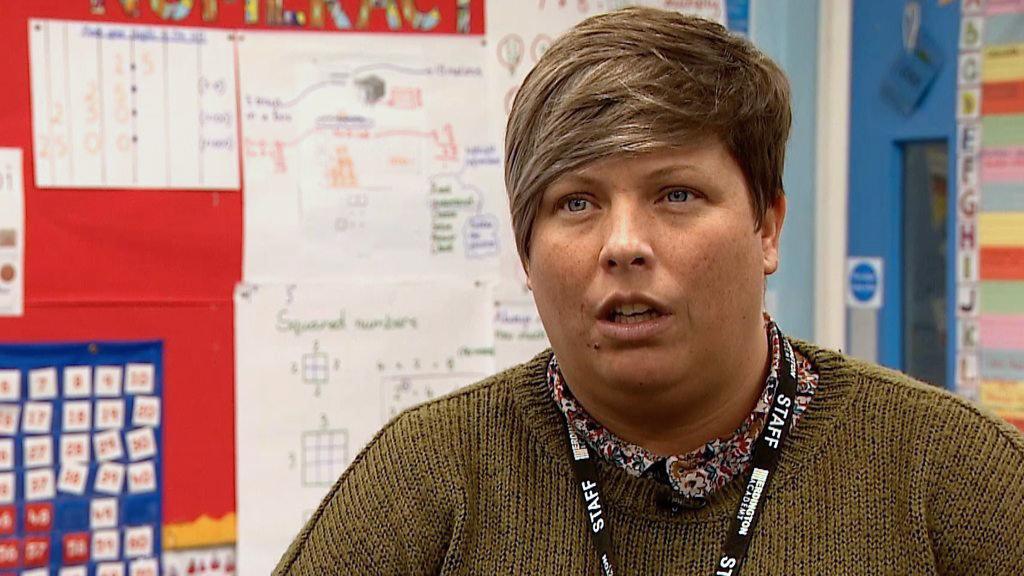Transcript: The challenge of being a teacher with Tourette's
- Published
This is a transcript of The challenge of being a teacher with Tourette's as first broadcast on 10 May 2019 and presented by Becca Bryers
BECCA - Hello this is the BBC Ouch podcast and I'm Becca Bryers. If my voice isn't immediately familiar to you, that's because I usually present another BBC podcast called Multi Story which showcases some of the most fascinating and engaging personal stories first broadcast on BBC local radio stations around England.
And today, I'm jumping into the Ouch hot seat to bring you one of them.
NATALIE- I've been thrown off public transport. I was asked to leave a membership at a health club. I've been attacked physically and verbally. I've been arrested; quite a bad arrest where they did not believe my Tourette's.
BECCA - Natalie Pearson lives in Birmingham, is engaged to be married this summer and has Tourette's syndrome, a condition that causes her to make involuntary sounds and movements called tics. For Natalie these can range from shouting out swearwords and mimicking other people's speech, to raising her eyebrows, jerking her neck and shoulders or even hitting herself.
For many Tourette's starts in childhood but for Natalie it came on a little bit later.
NATALIE- It was about two weeks before my 21st birthday. I was [sighs], I was raped at university and I remember being in a safe house, a police safe house and they wanted me to do interviews on camera. And they had to stop doing the interviews because I kept making like hiccup noises. I didn't understand where they'd come from or what they were.
[Music] I'd never heard of Tourette's back then; it wasn't as well publicised. And for three years I had no idea why I was making noises and shouting things out and twitching and that. And one thing stands out is losing a job at a pub where I was shouting things at the customers. And I just thought I was turned into this horrible person that just couldn't control their emotions or anger anymore because of what had happened.
It was only after watching a programme and thinking that seems very much like what I've got that I realised that it was something I needed to get looked into, and understanding now that I had a late onset of Tourette's and the trigger was what happened at university.
BECCA - Natalie says her Tourette's is a constant reminder of the trauma of the rape. And on top of dealing with the anxiety and depression it sparks there's the physical strain the tics cause to her body. She describes the vocal tics like a bubble she can feel start in her chest and build up through her neck before it bursts out of her mouth. But that moment of relief is often replaced by a keen self-awareness, and unfortunately sometimes a frustration at the negative reactions of other people.
NATALIE- I was with my partner's family and we were in a restaurant and people started complaining about my tics, and the staff at that restaurant started moving people to tables further away and apologising for me, and gave free drinks to those people to apologise for the fact that I was in a restaurant. And all that does is it makes me feel embarrassed, yeah, embarrassed and upset. And you then start to feel like you've ruined everyone else's evening, not just the people you're with but other people's.
BECCA - This kind of reaction has made an impact on how often Natalie goes out in public. And the onset of the condition has undeniably caused a setback in all areas of her life. But they have only been setbacks, and she's persistently pursued her dream career.
NATALIE- [Video clip] Oh gosh! Your jumpers are not purple; they're red. What a weird thing.
BECCA - Natalie started out her teaching career as a PE teacher at a secondary school. But an injury forced her to move to science and social care, away from the sports field and into the confines of a classroom.
NATALIE- Every teacher on their first day in front of a class it would be daunting. That's the scariest position: are you going to know more than the kids? Are you going to know enough to be able to teach them? But then having a side of you that can be unpredictive [sic] and say what you shouldn't say that adds this extra level of nervousness towards it that maybe I'll shout out the wrong answer; maybe I'll shout that I don't know something; maybe I'll embarrass myself in a way that I don't want those students to see me.
[Music] I've been teaching 15 years in the same school. It has taken a long time to get to the position of feeling comfortable with my Tourette's in my own classroom and being in front of students every day. There's been a journey that's gone up and down. I still face battles. I'm never going to give up on the fact that I am a teacher with Tourette's. Yes, I do shout things that I shouldn't, yes I might swear in front of students, but it's about me explaining to those students that that is not on purpose and this is a disability, it's a syndrome that I've got and it's separate to someone just swearing in class. Because it could be quite easy for students to shout and swear back and say, well you do it. I never get that. I never get that now, and that shows a big level of maturity in these young people that I see every day.
[Video clip] Excellent. People could be offended by me, couldn't they? Do you think that people might have been offended by me in the past?
BECCA - As well as teaching her own classes Natalie goes into other schools to talk to children from primary age upwards, actively encouraging a conversation about her Tourette's and other disabilities.
[Video clip]
NATALIE- Some people have hit me, all because of things that I can't control. Do you think that I let that stop me doing what I want to do?
CLASS - No.
NATALIE- No, never, never. Because my Tourette's is part of me, and I am the only teacher in the world with Tourette's. [Gasp] Because people think that if you've got something like Tourette's that you can't do certain things; if you've got something like autism that you can't do certain things; if you've got dyslexia you can't do certain things. People are always going to make it harder for you if you're a little bit different. Are we going to let that stop us?
CLASS - No.
NATALIE- No. Do you know what we're going to do? We're going to make that our driving force; we're going to say okay…
[End of clip]
NATALIE- As I've grown in teaching I've grown in an understanding of difficulties that SEN students face out there in the real world getting a job. And that's why I feel that there is this big responsibility on me now, the fact that there is no other teacher teaching with Tourette's means that I need to put something out there, not just for those people to go into teaching, but for those people to go into those areas of work that they've been told, you'll never get into that, you've got ADHD, you'll never be a writer, you're dyslexic, you're never going to teach, you've got Tourette's. No. That's what I want to get out. That is something I'm so passionate about that they have those aspirations that are beyond what someone thinks they can be, know that they can get there. Because it might be harder, the road might not be as straight as what it could be for someone else, but that's what's going to make it all the more enjoyable once you get there.
[Music] I go back and I speak to a lot of students and I go back and see what they're doing in their careers now, and they come back to me and tell me what they're doing, and to see that success and to see that they've made something despite barriers that they had, and for them to tell me that they've felt that was possible because of me I've been in tears over that in the past, happy tears. It's just such a warming feeling in your heart that you've empowered someone to feel that they could get there. That's a feeling you can't describe. And I guess that's what every teacher should feel really that we help those students reach those high aspirations every day.
BECCA - Natalie was speaking to Anthony Bartram from Inside Out East Midlands. There was one point in their longer interview where he asked Natalie, would you change it, would you take away your Tourette's if you could. And she said no, because despite all the pain it's brought she can't overlook all the good work it's inspired her to do. It's part of her now.
And there are some unexpected plus points:
NATALIE- Sometimes it's really funny my Tourette's. I like the jokes. Some of the jokes are better than ones I know so it's where I get most of my material!
My shoes are made of bread - long pause - loafers. [Laughter]
BECCA - Since this recording Natalie has got a new job at the same school. She'll still be teaching some science, but much of her week will now be focused on being a special educational needs coordinator, supporting, guiding and inspiring pupils who need a little more help.
[Music] My name is Becca Bryers and you've been listening to the Ouch podcast in collaboration with Multi Story - another podcast from BBC local radio.
The Ouch team love to hear from you, so, if you want to contact them they are on BBC Ouch on Twitter and Facebook and ouch@bbc.co.uk on email.
And if you've liked what you heard from me today, why not download and subscribe to Multi Story too. There's plenty of great stories like Natalie's to catch-up on and plenty more coming in the next few weeks. You can find it on BBC Sounds.
- Published10 May 2019

- Published26 February 2019
